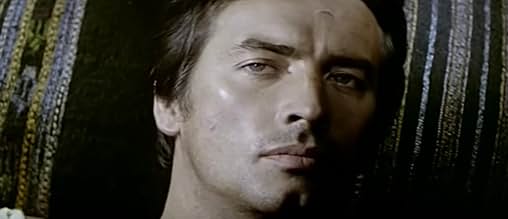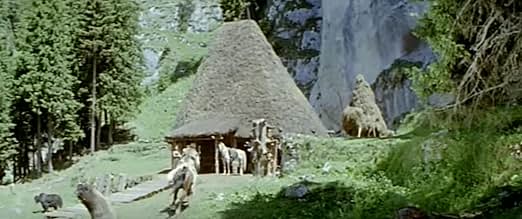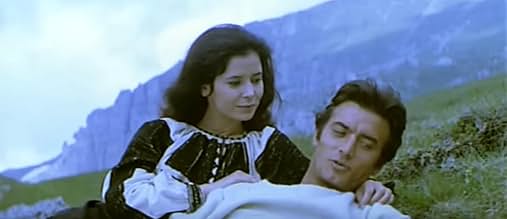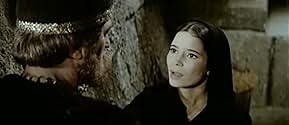AVALIAÇÃO DA IMDb
7,6/10
2,1 mil
SUA AVALIAÇÃO
Adicionar um enredo no seu idiomaThe Dacian kingdom lies at the eastern border of the Roman Empire.Only the river Danube separates the two mortal enemies.The Dacian king Decebalus knows that soon the vastly superior Roman l... Ler tudoThe Dacian kingdom lies at the eastern border of the Roman Empire.Only the river Danube separates the two mortal enemies.The Dacian king Decebalus knows that soon the vastly superior Roman legions will cross the river and attack Dacia.The Dacian kingdom lies at the eastern border of the Roman Empire.Only the river Danube separates the two mortal enemies.The Dacian king Decebalus knows that soon the vastly superior Roman legions will cross the river and attack Dacia.
- Direção
- Roteiristas
- Artistas
Ion Besoiu
- Roman Gen. Severus
- (narração)
- Direção
- Roteiristas
- Elenco e equipe completos
- Produção, bilheteria e muito mais no IMDbPro
Avaliações em destaque
Nicolaecu's movie is one of the greatest Romanian films ever made. The leading role of the king belongs to Amza Pellea, who wonderfully combines the force of the ancestors and the art of giving life to such a character.
The genuine landscapes bring the viewer into a prodigious world of mystery and ancient beliefs which are now violently invaded by the roman conquerors. The co-production benefits not only from the performance of the actors, the settings or the daring achievement in directing of Nicolaescu, but also from the unique, yet true story.
This is what i call a good movie, but this is the comment of a novice in matters of movie critics. For those who enjoy spending precious time on movies, this is worth watching.
The genuine landscapes bring the viewer into a prodigious world of mystery and ancient beliefs which are now violently invaded by the roman conquerors. The co-production benefits not only from the performance of the actors, the settings or the daring achievement in directing of Nicolaescu, but also from the unique, yet true story.
This is what i call a good movie, but this is the comment of a novice in matters of movie critics. For those who enjoy spending precious time on movies, this is worth watching.
This is really a very impressive movie, one of my favourites. And what is its major advantage? It's a deep and natural empathy for the ancient past without any need to add some artifical tricks. Music score perfectly matches with all scenes. Landscape views with marching or fighting legions are superb. Unfortunately, at least VHS record is very hard to find and DVD doesn't exist so far. There should be no doubts that this movie, as well as some other similar releases, deserve a better international recognition of fans and connoisseurs.
A Romanian film – better-known, if at all, by its original title DACII – about the Roman (i.e. Italian) Empire is an absolute rarity, but I was instantly drawn to it from the evocative stills I saw on the Internet. The fact that it featured a couple of French stars in Pierre (MILL OF THE STONE WOMEN {1960}) Brice and Luis Bunuel/peplum regular Georges Marchal, then, was merely the icing on the cake; however, it did feel odd hearing them speak in a completely foreign tongue! For all its obvious naivete' (being, at best, a semi-professional enterprise and actually only the director's first feature-length effort!), the end result proves reasonably impressive – primarily on the visual front (with location photography that is indeed spectacular and the battle sequences themselves emerging as not only surprisingly elaborate but rather brutal as well!).
That said, the plot offers its own interest – with even some novelty value in store: the titular people are engaged in war against the Romans (rulers of all the known world at that time). Being Pagans, to determine whether the odds are in their favor or not, it is required that the King sacrifice his first-born i.e. a son who is literally dumped upon an upturned fork and bleeding to death! This turn-of-events naturally sours the relationship between the potentate and his daughter, who leaves the castle grounds to settle in the country. The Romans, too, have their problems: Emperor Domitien is perhaps the most condescending ever portrayed; his adviser is adamantly against invasion (believing the Dacians can be persuaded to lay down their arms without the need for carnage); their ageing if still athletic champion warrior (Marchal) is suffering from temporary blindness due to an old wound; while another 'star' officer (Brice, actually the afore-mentioned bureaucrat's son) is wounded during an initial skirmish, cured for by the Dacian king's daughter (needless to say, they end up falling in love), and ultimately revealed to be a native of the very land he is intent on conquering for the glory of Rome!
A sort of follow-up, made by other hands, was 1968's COLUMNA aka THE COLUMN which similarly featured 'recognizable' names for the international market (though their overseas exposure was extremely limited in the long run!): Briton Richard Johnson and Italians Antonella Lualdi (from Vittorio Cottafavi's THE HUNDRED HORSEMEN {1964}) and Franco Interlenghi. Actually, THE DACIANS reminded me of Robert Siodmak's two-parter STRUGGLE FOR ROME (1968) – a German epic that was only released abroad in heavily-truncated form as THE LAST ROMAN.
That said, the plot offers its own interest – with even some novelty value in store: the titular people are engaged in war against the Romans (rulers of all the known world at that time). Being Pagans, to determine whether the odds are in their favor or not, it is required that the King sacrifice his first-born i.e. a son who is literally dumped upon an upturned fork and bleeding to death! This turn-of-events naturally sours the relationship between the potentate and his daughter, who leaves the castle grounds to settle in the country. The Romans, too, have their problems: Emperor Domitien is perhaps the most condescending ever portrayed; his adviser is adamantly against invasion (believing the Dacians can be persuaded to lay down their arms without the need for carnage); their ageing if still athletic champion warrior (Marchal) is suffering from temporary blindness due to an old wound; while another 'star' officer (Brice, actually the afore-mentioned bureaucrat's son) is wounded during an initial skirmish, cured for by the Dacian king's daughter (needless to say, they end up falling in love), and ultimately revealed to be a native of the very land he is intent on conquering for the glory of Rome!
A sort of follow-up, made by other hands, was 1968's COLUMNA aka THE COLUMN which similarly featured 'recognizable' names for the international market (though their overseas exposure was extremely limited in the long run!): Briton Richard Johnson and Italians Antonella Lualdi (from Vittorio Cottafavi's THE HUNDRED HORSEMEN {1964}) and Franco Interlenghi. Actually, THE DACIANS reminded me of Robert Siodmak's two-parter STRUGGLE FOR ROME (1968) – a German epic that was only released abroad in heavily-truncated form as THE LAST ROMAN.
I wish people were less "detached" and less bored sometimes, to appreciate valuable movies for what they really are - valuable movies. As I am about to finish watching "Columna" on TV here in Bucharest, I'm thinking how lucky we are to have this fascinating history. To us, both "Dacii" and "Columna" are excellent and make very valid points as to how ancient Dacia was conquered by the Romans.
I am sorry that these movies (as many other Romanian historical movies) are not easy to find in the West, as the viewer comments on here seem to indicate. (I'd initially come on here to see where they could be found, to recommend them to a friend in the West). I think they would also prove useful, providing a wealth of information and "insight" for anyone wanting to learn more about this part of the world.
I am sorry that these movies (as many other Romanian historical movies) are not easy to find in the West, as the viewer comments on here seem to indicate. (I'd initially come on here to see where they could be found, to recommend them to a friend in the West). I think they would also prove useful, providing a wealth of information and "insight" for anyone wanting to learn more about this part of the world.
The newspaper "Adevarul" (the Truth) releases on DVD the "Historical" series of movies made by Sergiu Nicolaescu in the '60s, '70s and '80s. This contains the movies "Dacii" (the dacians), "Mircea", "Mihai Viteazul", "Nemuritorii" (the Imortals), "Capcana mercenarilor" (the mercenaries' trap), "Pentru patrie" (for the country). They are restored from film rolls from the National Film Archive (or national television archive), but quality is limited to VHS resolution. Given the film and audio technology level in 1967 the soundtrack is mono with subtitles in English and french. Colors are restored, but some scratches are visible throughout the movie, given its 41 years of age. Visual or audio effects were no concern for Nicolaescu, since its movies are based on historical facts transcending time and people. Fight scenes are real, using 5000 plus extras synchronized and filmed with multiple cameras, since no more than two takes were possible in one day at that scale. I don't know if the movies will be available outside the country, since are distributed only with the paper. http://www.filmeleadevarul.ro/istorice/category/filme/dacii/
Você sabia?
- CuriosidadesThe Dacian costumes were hard to create. Director Sergiu Nicolaescu had to travel to Rome where he studied the Dacian costumes featured on Trajan's Column. The costumes were created by Romanian costume designer Hortensia Georgescu.
- Erros de gravaçãoIn some scenes, watches are visible on the wrists of Roman and Dacian soldiers.
- ConexõesReferenced in German Grusel - Die Edgar Wallace-Serie (2011)
Principais escolhas
Faça login para avaliar e ver a lista de recomendações personalizadas
- How long is The Dacians?Fornecido pela Alexa
Detalhes
Bilheteria
- Orçamento
- ROL 20.113.000 (estimativa)
- Tempo de duração
- 1 h 50 min(110 min)
- Mixagem de som
- Proporção
- 2.35 : 1
Contribua para esta página
Sugerir uma alteração ou adicionar conteúdo ausente









